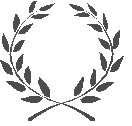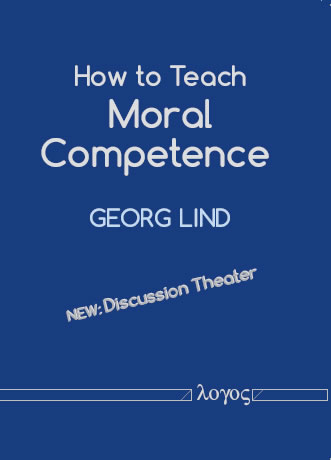Home | Program | Travel Info | Donation
Pre-Symposium Workshop:
KMDD / Discussion Theater
Past events
(1979-2020)
Last revision: July 13, 2021 (important change)
Invitation to the
16th International Symposium. New date: January 21 - 22, 2022
Online streaming will be announced here soon
Moral Competence:
Its Nature, Relevance, and Education
Location
Presentations on "restream.io" (link and password will be send to the presenters soon)
Streaming for audience on these channels on YouTube will be published here soon.
Topic & Aim:
 2021 "Outstanding Book Award" by the Moral Development and Education SIG of the Amerian Educational Research Association (AERA)
2021 "Outstanding Book Award" by the Moral Development and Education SIG of the Amerian Educational Research Association (AERA)

2019. Logos Publisher, Berlin.
Free download:
Chapter 4: How to make moral competence visible.
Moral-democratic competence is urgently needed. Democracy, as a way of living together (John Dewey), is not easy. While most, if not all, of us esteem the moral ideal of democracy, we find it often very difficult, if not impossible, to solve the problems and conflicts which this ideal inevitably produces: How should we decide, when we cannot be just without lying, or cannot be free without being unjust, or cannot be truthful without ending a cooperation? How can we find a solution by thinking and discussion only, instead of using brute force, or deceiving others and ourselves, or by bowing down to some authority, letting them decide for us what is right or wrong?
As research shows, most people lack moral-democratic competence. Most people did not have the opportunity to develop this ability and thus cannot solve the moral dilemmas of democratic life without resorting to violence, deceit or submission to an authority. Hence, they tend to pursue moral ideals with immoral means. Hence, they would behave morally, if they would have the opportunity to develop their moral-democratic competence. As Socrates states: Those who really understand what the right thing to do is, cannot help but do it.
The Symposium brings together scholars and practitioners who have taken up Socrates' insight. They present correlational and experimental studies as well as practical experiences, which deepen our understanding of the meaning and relevance of moral-democratic competence, as well as our methods to foster it.
For important research questions and standard of good moral psychology, see: http://moralcompetence/mut/moral_competence_research.html.
Important dates: (note changes)
- Confirmation of presentation and the symposium: June 10th, 2021
- Final program: June 30, 2021
- Symposium: July 31 - Aug. 01, 2021
Bank: Sparkasse Bodensee
IBAN: DE51 6905 0001 0026 5515 07
Purpose: IMDC Symposium
1st day: Lectures with discussion
2nd day: Online workshop on MCT and KMDD
(In preparation - working titles)
Symposium
Satureday, July 31, 2021 (in English)
Chair: Ewa Nowak
12:00 - 12:10 "Take-over of Georg's Symposium Series Since 1979: Opening of the first international symposium by the new Institute for Moral-Democratic Competence (IMDC) e.V.," by Dr. Leonore Link, IMDC Board.
12:10 - 12:15 "Overview on the Program," by Prof. Ewa Nowak, Chair of the Institute for Ethics, Adam Mickiewicz University, Poznan, Poland.
12:15 - 12:55 "News on Moral Competence -- Its Nature, Relevance and Teachability." apl. Prof. em. Dr. Georg Lind, Institute for Moral-Democratic Competence (IMDC) e.V., Konstanz, Germany.
"Moral competence, although this concept is being used since over fifty yesars, itis still a relatively new and little understood concept. Most people and also many scientists still believe that in order to behave morally, we only need to have moral ideals and standards, and the these standards are imposed on us by some social agent. No, Socrates said already two and a half thousand years, the wish to be moral is inborn. It is "virtue" (ability, competence) that counts. Today we know for sure: We need to develop moral competence to be able to solve the problems and conflicts which our wish to act morally inevitably produces. Otherwise, we must rely on violence and deceit, or submit to some authority for solving them."
13:00 - 13:55 "Does Teacher Education Promote Moral Competence? A Cross Sectional Study in Three Chilean Universities." Dr. Daniel Tello, formerly: Universidad de Concepción, Chile, now: Institute for Moral-Democratic Competence (IMDC) e.V., Konstanz, Germany.
In work: "If we want to promote the low moral-democratic competence of our next generation, we need at least morally competent teachers. Of course, they also need additional training by methods like the KMDD (Lind 2019).
Does present teacher education in my home country Chile do something for this end? Do teacher students gain moral competence while attending teacher education programs? I tried to find an answer by surveying nnn first and nnn last year studente with the Spanish version of Moral Competence Test by Lind (1978; 2019) and their learning environment (Schillinger 2009) cross-sectionally. The findings were disappointing. Their overall level of moral competence was rather low (C-score = 19). However, in some fields of study, students who experienced a favorable learning environment, showed higher moral competence. They also gained ??? C-points during their study. So it seems possible to foster teacher students' moral competence if their learning environment is improved. In my presentation I discuss how this could be done."
14:00 - 14:55 "The Importance of Moral Competence for Language Learning." (asked) Prof. Dr. Roma Kriaučiūnienė, University of Vilnus, Lithuania.
15:00 - 15:55 "Moral Competence and Orientation in Relationship with Emotion Regulation Goals." Dr. Lucia Faiciuc, Romanian Academy.
"One’s moral life may lead to certain emotion regulation goals, and the preference for certain emotion regulation goals may lead to certain moral issues. This relationship was studied in a pilot research, using Moral Competence Test: MCT and a questionnaire for emotion regulation goals. Moral competence index correlated positively with the willingness to adjust one’s emotions to the context, and with the willingness to decrease the intensity of one’s own emotions."
16:00 - 16:55 "How Moral Competence Prevents Social Divide - Plan for An Empirical Study." Dr. Kay Hemmerling, Institute for Moral-Democratic Competence (IMDC) e.V., Konstanz, Germany.
"Can low moral competence, which is exhibited in high level of “opinion agreement”, contribute to, or even cause, a social divide? Or, to put it differently, can we prevent a social divide by fostering moral competenc? In order to find an answer to these questions, I will describe in this presentation my plan for an empirical study, in which I will investigate the impact of moral competence (MCT) on tolerance of ambiguity tolerance (Budner) as well as on the "internal logic" of beliefs in the field of virology and epidemiology. For measuring internal belief logic, I will adapt Kietzig's Religious Consistency Test." More...
17:00 - 18:00 "Achievements of Moral Competence Research and Education, and Future Devevelopment." General discussion.
Sympsium continued (in English)
Sunday, Aug. 1, 2021
Chair: Georg Lind
12:00 - 12:55 "Democratic Firms as Learning Environments for Morally Relevant Behavioral Orientations: Hopes and Worries Regarding Democracy in Firms and Enterprises." Prof. Dr. Wolfgang Weber, University of Innsbruck, Institute of Psychology, Innsbruck, Austria.
13:00 - 13:55 "The importance of using developing moral competence for adjudication by social judges." Dr. Pawel Mazur, Adam Mickiewicz University, Poznań, Poland.
"One of the manifestations of citizen’s moral judgment competence (and their justificatory, discourse and democratic competences as well) in public contexts and institutions (at least in the European countries) is their participation in the system of justice as lay judges of or social judges. In my speech, I will discuss the following theses: When using developing a certain degree of moral competence, that is, the ability to resolve conflicts on the basis if inner moral principles through deliberation and discussion, the social judges would enrich and supplement the judicial application of the law. I will show this on the basis of the process of shaping the punishment in the criminal trial."
14:00 - 14:55 "Moral competence, gender bias and segmentation, effect. Religiosity is not the only cause." Prof. Dr. Ewa Nowak, Poznan, Poland.
------------- Workshop -------------
Chair: Kay Hemmerling
15:00 - 15:05 Opening
15:05 - 15:55 "Making moral competence visible - objektively and validly, that is, without subjective or dubious statistical assumptions." Introduction by Georg Lind
"Psychological and educational research has been hampered for many decades by a serious methodological dilemma: On the one side, it is believed that, in order to get valid data, psychological traits can only be assessed through subjectiv clinical interviews or other "qualitative" methods of inquiry. On the other side, it is believed that the use of subjectiv methods prevents psychology from becoming a generally acknowledged science.
As a better alternative, two suggestions have been made: (a) The founder of "behaviorism" Watson (1912) suggested that we exclude internal psychological traits (like moral competence) from the research agenda of psychology. But this leaves this discipline without an object! In spite of this consequence, many psychologists adhere to the Watsonian behaviorism. (b) Yet, in order to keep psychological topics on the agenda of research, many replaced internal psychological traits (like moral competence) by external concepts (like social norms). The most famous in the field of moral psychology are Hartshorne & May (1928). Doing so, they replaced the psychological underpinning of individual human traits by statistical postulates, and individual data by sample data (Classical Test Theory and its offsprings). However, by doing so, they lost any validity. Their "objektive" psychometric tests measure wrong objects.
In order to solve this dilemma between subjectivity and validity, I have developed the concept of Experimental Questionnaires (EQs) (Lind 1982), on which the Moral Competence Test (MC) is based (Lind 2019). With EQs we can construct valid methods for making internal psychological traits visible! EQs use multivariate experimental designs for constructing stimuli (questions, statements etc.) that elicit a pattern of reactions (answers, behaviors, judgmens etc.)which reveals the inner forces behind them. This concepts ows much to the "diacritical method" by Egon Brunswik (1955), who is one of the few psychologists who acknowledges the ambiguity of isolated acts, on which Classical Test Theory rests. The diacritical method (or multivariate design of items) allows us to disentangle the possible meanings of a person's response behavior. Thus, the MCT can make moral competence directly visible without statistical methods. Moreover, decades of moral psychological research provides us with clear criteria for testing its theoretical validity by experimental means.
I will demonstrate the idea behind the EQs concept and how it is applied to moral competence testing and can also be applied to other psychological traits. I hope for many questions."
16:00 - 16:55 How to check the theoretical validity of the MCT." Introduction by Daniel Tello
Chair: Georg Lind
17:00 - 18:00 "We need more certified KMDD-Teachers!" Outlook: KMDD-Workshops and IMDC-Colloquium series this fall. 17th International Symposium 2022, and more.
Please allow sufficient time for discussion.
Slides should be readable (minimum font size: 18), there should be not too many, and they should not contain too much information or abbreviations.
We suggest that all presenters put their paper on their web-site and send its link to the audience on the chat channel of the conferencing platform. so that they can download them.
Short descriptions and slides of the presentations can be send to the program coordinator: georg.lind[ät] moralcompetence.net for publication on this symposium site.
The online journal "ethics in progress" (editor: Ewa Nowak) invites all presenters to submit their revised paper to this journal.
Impressum, Kontakt und Haftungsausschluss | Datenschutz | (c) Copyright von Dr. Dr. Georg Lind | KMDD® ist eine in vielen Ländern geschützte Marke